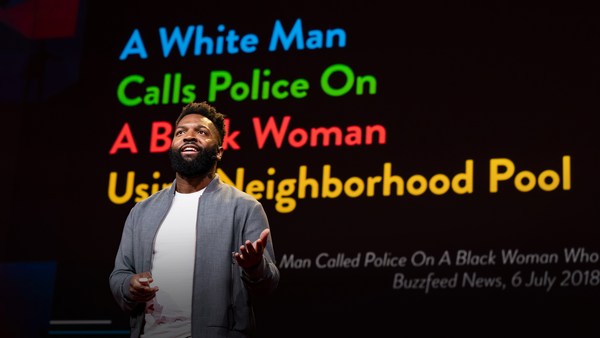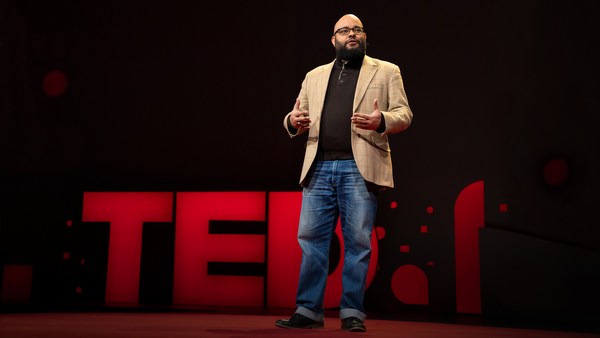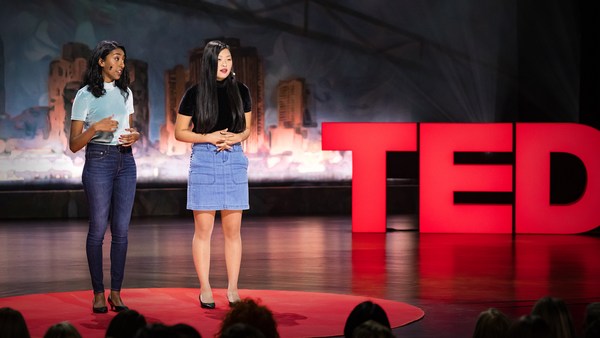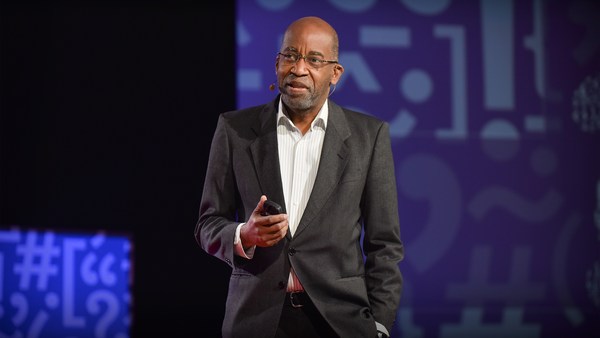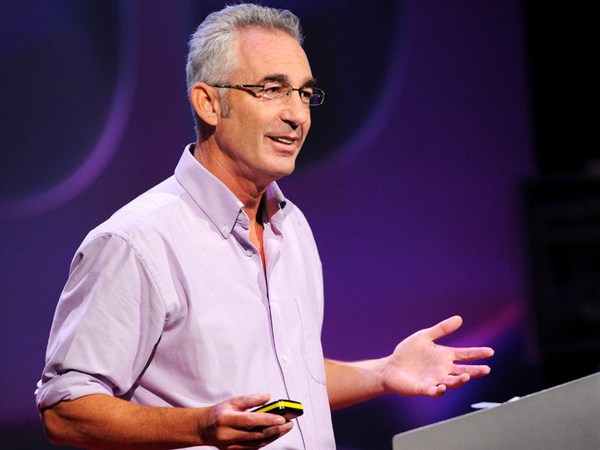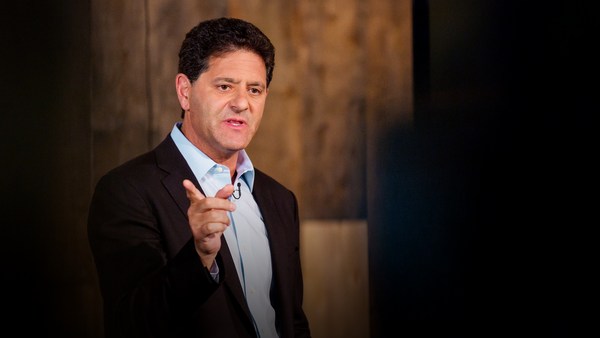I am a public policy wonk. I investigate data that points to problems in the American economy -- problems like rising household debt, declining wages and benefits, shortfalls in public revenue. And I try to pinpoint solutions to make our economy more prosperous for more people. I geek out about tax policy and infrastructure investments, and I get really excited by a gracefully designed regulatory regime.
(Laughter)
These are the kinds of topics that I was talking about on a public television live call-in show in August of 2016. I was about halfway through the program when a man called in, identified as Gary from North Carolina and he said ... "I'm a white male, and I'm prejudiced." He then went on to detail his prejudice, talking about black men and gangs and drugs and crime. But then he said something that I'll never forget. He said, "But I want to change. And I want to know what I can do to become a better American."
Now remember, my career is about economic policy, as translated into dollars and cents not personal thoughts and feelings. But when I opened my mouth to respond to this man on live television, the most surprising words came out. I said ... "Thank you." I thanked him for admitting his prejudice, for wanting to change and for knowing, somehow, that that would make him a better American.
The exchange between Gary and me went viral. It's been viewed over eight million times and inspired waves of social media commentary and news coverage. And I think people were surprised that a black woman would show such compassion for a prejudiced white man, and they were surprised that a white man would admit his bias on national television.
Not long after Gary and my viral moment, we met in person. He said that he had taken my advice. He said that my words had been like someone wiped the dust from a window and let the light in. Over the years, Gary and I have become friends. And Gary would tell you that I've taught him a lot about systemic racism in America and public policy. But I've learned a lot from Gary, too.
And the biggest lesson for me has been that Gary's prejudice has caused him to suffer. Fear, anxiety, isolation. And it's made me rethink many of the economic problems I've been focusing on my entire career. I wondered, is it possible that our society's racism has likewise been backfiring on the very same people set up to benefit from privilege?
Driven by this question, I've spent the past few years traveling the country, researching and writing a book. My conclusion? Racism leads to bad policymaking. It's making our economy worse. And not just in ways that disadvantage people of color. It turns out it's not a zero sum. Racism is bad for white people, too.
Take, for example, America's underinvestment in our public goods, the things that we all need, that we share in common -- our schools and roads and bridges. Our infrastructure gets a D plus from the American Society of Civil Engineers, and we invest less per capita than almost every other advanced nation. But it wasn't always this way. I traveled to Montgomery, Alabama, and there, I saw how racism can destroy a public good and the public will to support it.
In the 1930s and '40s, the United States went on a nationwide building boom of public amenities funded by tax dollars, which in Montgomery, Alabama, included the Oak Park pool, which was the grandest one for miles. You know, back then, people didn't have air conditioners, and so they spent their hot summer days in a steady rotation of sunning and splashing and then cooling off under a ring of nearby trees. It was the meeting place for the town. Except the Oak Park pool, though it was funded by all of Montgomery citizens, was for whites only.
When a federal court finally deemed this unconstitutional, the reaction of the town council was swift. Effective January 1, 1959, they decided they would drain the public pool rather than let black families swim, too.
This destruction of public goods was replicated across the country in towns not just in the South. Towns closed their public parks, pools and schools, all in response to desegregation orders, all throughout the 1960s. In Montgomery, they shut down the entire Parks Department for a decade. They closed the recreation centers, they even sold off the animals in the zoo.
Today, you can walk the grounds of Oak Park, as I did, but very few people do. They never rebuilt the pool. Racism has a cost for everyone.
I remember having that same thought on September 15, 2008, when I learned the breaking news that Lehman Brothers was collapsing. Now Lehman was, like the other financial firms that would go under in the coming days, done in by overexposure to a toxic financial instrument based on something that used to be simple and safe -- a 30-year fixed-rate home loan. But the mortgages at the center and the root of the financial crisis had strange new terms. And they were developed and aggressively marketed for years in black and brown middle-class communities, like the one that I visited when I met a homeowner named Glenn. Glenn had owned a home on a leafy street in the Mount Pleasant neighborhood of Cleveland for over a decade. But when I met him, he was near foreclosure. Like nearly all of his neighbors, he'd received a knock on the door from a broker promising to refinance his mortgage. But what the broker didn't tell him was that this was a new kind of mortgage. A mortgage with an inflated interest rate, and a balloon payment and a prepayment penalty if he tried to get out of it.
Now, the common misperception, then and still today, is that people like Glenn were buying properties they couldn't afford. That they themselves were risky borrowers. I saw how this stereotype made it harder for policymakers to see the crisis for what it was back when we still had time to stop it.
But that's all it was. A stereotype. The majority of subprime mortgages went to people who had good credit, like Glenn. And African Americans and Latinos were three times as likely -- even if they had good credit -- than white people, to get sold these toxic loans. The problem wasn't the borrower -- the problem was the loan.
After the crash, most of the nation's big lenders, from Wells Fargo to Countrywide, would go on to be fined for racial discrimination. But that realization came too late. These loans, superprofitable for the lenders but designed to fail for the borrowers, spread out past the confines of black and brown neighborhoods like Glenn's and into the wider, whiter mortgage market.
All of the nation's big Wall Street firms bet on these loans. At its peak, one out of every five mortgages in the country was in this mold, and the crisis, the crisis that my colleagues and I saw coming ... would go on to cost us all. Nineteen trillion in lost wealth. Pensions, home equity, savings. Eight million jobs vanished. A home-ownership rate that has never recovered. My years of advocating in vain for homeowners like Glenn left me convinced: we would not have had a financial crisis if it weren't for racism.
In 2017, I traveled to Mississippi, where a group of auto-factory workers was trying to organize into a union. Now the benefits they were fighting for -- higher pay, better health care coverage, a real pension -- they would have helped everybody at the plant. But in person after person that I talked to -- white, black, for the union, against the union -- race kept coming up. A white man named Joey put it this way. He said, "White workers think I ain't voting yes if the blacks are voting yes. If the blacks are for it, I'm against it." A white man named Chip told me, "The idea is that if you uplift black people, you're downing white people." It's like the world's got this crab-in-a-barrel mentality. Now, the union vote failed. Wages at the plant are still lower than their unionized peers', and people there still worry about their health care.
You know, it's tempting, perhaps, to focus on the prejudiced attitudes of the men and the workers that I heard in Mississippi. But I'm more interested in holding accountable the people who are selling racist ideas for their profit than those who are desperate enough to buy it.
My travels also took me to places where I saw, however, that it doesn't have to be this way. I went to Maine, the whitest state in the nation, the oldest, where there are more deaths every year than births, and I went to this dying mill town called Lewiston that is being revitalized by new people -- mostly African, mostly Muslim, immigrants and refugees. There, I met a woman named Cecile, whose parents had been part of the last wave of new people to come to Lewiston. These are French-Canadian millworkers at the turn of the century. Cecile is retired, but she had found a new purpose in life, by organizing Congolese refugees to join with the white retirees at the Franco Heritage Center.
(Laughter)
These men and women from the Congo were helping these retirees remember the French that they hadn't spoken since their childhoods. And together, these two communities helped each other feel at home.
You know, for all the political talk about the newcomers being a drain on the town, a bipartisan think tank found that the local refugee community there created 40 million dollars in tax revenue, and 130 million in income. And I talked to the town administrator, who was boasting about the fact that Lewiston was building a new school, when all the rest of towns like theirs in Maine was closing them.
You know, it costs us so much to remain divided. This zero-sum thinking, that's what's good for one group has to come at the expense of another, it's what's gotten us into this mess. I believe it's time to reject that old paradigm and realize that our fates are linked. An injury to one is an injury to all. You know, we have a choice. Our nation was founded on a belief in a hierarchy of human value. But we are about to be a country with no racial majority.
So we can keep pretending like we're not all on the same team. We can keep sabotaging our success and hamstringing our own players. Or we can let the proximity of so much difference reveal our common humanity. And we can finally invest in our greatest asset. Our people. All of our people.
Thank you.
(Applause)
